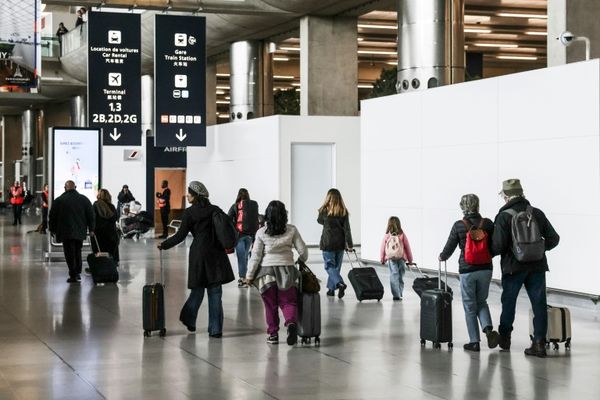
The worst tackle Álvaro Morata has suffered at the Euros came from his own team. At the end of the semi-final, as Spain celebrated, a fan leapt on to the pitch in search of a selfie. When he set off, so did José Santos, the security guard who travels everywhere with them. Slipping, he accidentally went in two-footed, a big man with a beard and bulging biceps crashing into the striker; Morata’s knee twisted inwards, leaving him limping. An ice pack was applied and for a moment there was a fear that he could even miss Sunday’s final. Especially for Santos.
It is his job to look after Spain’s players; now, the Spain captain looked after him. “It’s only a yellow card,” Morata said as he boarded the bus, smiling but still not moving well. Back at the Öschberghof, their residency over the last month, and at the home of little SV Aasen, just across the road and over the fields where they train daily, it was a message the captain kept repeating, cracking jokes to make light of it, reassurance for the man who felt responsible: José, it’s fine. It’s also very like Morata.
There is something about Spain’s captain. A vulnerability, a sensitivity. A humanity, too. Perhaps he only externalises it more than other players, but it sometimes feels as if happiness lies just out of Morata’s reach, as if the bad moments, the misses, linger. Football hasn’t always been good to him; people haven’t either. The pressure weighs, the game takes its toll, the misses play on his mind. He admits that there have been times in his career when he aspired not to be noticed, and he has talked eloquently about seeking support from psychologists.
At times he has been a meme, or worse, and he has felt it, like everything he gives isn’t given back: whistled by Spain fans at Euro 2020 and again at the Santiago Bernabéu in the spring, he said: “My kids can’t understand why there are people who are so angry with their dad.” This season had started as his best, feeling like another breakthrough, and ended as one of his worst in terms of goals: he scored twice after January. “If I have to go the rest of the season without a goal for us to win the Euros or to lift a trophy with Atlético, I’d sign up for that right now,” he said.
On the eve of the semi-final, he told El Mundo this would probably be his last tournament. The attacks, he believes, have been as constant as they are unfair and he admitted that at times he felt “naked” in front of people. “They criticise me when I would cut my arm off to win the Euros,” he said. “In Spain there is no respect for anyone or anything.”
Out there, perhaps not; in here, it could hardly be any different. Asked about Morata’s words – and, in truth, the timing wasn’t great – the head coach of Spain, Luis de la Fuente, replied: “My position? My position is always, always in favour of Álvaro, as a player and a person. We completely agree with what he says: the treatment he gets is totally unfair. He is our captain, an example in everything he does, as important off the pitch as he is on it. I would like people to recognise what he has done for Spanish football.” Asked a few days earlier which player he would like to be reincarnated as, the coach replied: “Álvaro Morata.”
This was not just a public defence; it is private. And nor is it just De la Fuente. It is not just about goals either, and he has 36 of them for Spain. Captain of the team that play higher up the pitch than any other in European Championship history, Morata is the striker who has committed more fouls than any player at Euro 2024, his personality reflected on the pitch and beyond it too. “The most important thing is the work, the solidarity: he plays up front and yet he’s the one who runs the most,” says the attacking midfielder Dani Olmo.
“We’re lucky to have Álvaro with us: he’s our captain, and we couldn’t be more grateful,” the defender Dani Vivian insists. “The way that he defends is the way he lives: day to day and in everything he does for each and every one of us. It’s impossible to be more committed. He finishes every game practically in tears because he feels so much responsibility, because he so badly wants everything to go well for us.”
Morata told Uefa: “It’s not because of the responsibility, I don’t think. It’s pure emotion, like a fan in the stands. When I’m playing, I’m 100% concentrated. When they sub me off it’s as if I were any of our players’ parents. I’m sure Mikel Merino’s parents cried the other day when he scored, then Lamine’s parents when he scored against France. I’m like that too. That’s my personality. I don’t think there’s any shame in crying about positive things, and I hope I have lots more to cry about on Sunday.”
Either way, it might be fitting if he did. Down in Donaueschingen they say that Morata is the best captain they have had. He is a little different too: no alpha male, no fist on the desk, but something quieter, kinder, caring. Here, the sensitivity is a strength. What he has lacked he wants to ensure that no one else wants for. He is, well, nice. And, despite the cliches, that is no bad thing. You will not find anyone who speaks ill of him.
“I don’t sleep much,” Morata says. “Sometimes I go down to the gym and there are staff there. They get up to go because they’re not supposed to be with the players much. I say: ‘Stay, I want to talk.’” One member of staff says: “He’s nothing like any other captain. He treats everyone equally well, whether it’s the best player in the team … or me.” In 2016, one of the security guards was a former secret service agent who had lost a finger in the Bataclan terror attack. Every day all the players passed without a word, except one: Morata would stop to chat. In Qatar, he shared his bonus among the staff that didn’t have one.
After the quarter-final against Germany, he turned up in the dressing room with a gift for the goalscorer Merino: he had gone looking for the ball. The next morning, the players who hadn’t started were called to train; Morata was the only starter who joined them. He is, Lamine Yamal insists, the person who gives him the most advice, echoes of what Rodrigo Riquelme said when he reached the Atlético team: “Me and my family are so grateful for Álvaro’s help. I don’t understand how people can criticise him; if they knew him they wouldn’t. But Spain, our society, tends to attack those who show goodness.”
The leadership is worn lightly, a freedom around the squad that wasn’t there at the World Cup, and it is shared, not imposed. Dani Carvajal, the competitor; Rodri, the tactician; Morata, the glue, there for everyone, the little acts of generosity many. And yet it is exercised when it has to be.
“People don’t know me, they don’t know what I am like in a dressing room,” he says. “I have been fortunate to learn from Koke, Sergio Ramos, Casillas, Chiellini, Bonucci, Buffon: great players and captains. It’s a question of prioritising the wellbeing of everyone in the group, ensuring there is no problem. The only bad thing is having to chase people to pay their fines. The hardest thing is getting everyone to agree on the clothes, the timetables, those kinds of things. There are a lot of us, all different. In the end, I put it to a vote. That’s what democracy is for, isn’t it?”
But when it came to resolving a dispute between Gavi and Dani Ceballos, he intervened decisively. Alongside Rodri and César Azpilicueta, he also led – and read – the statement against the behaviour of the former federation president Luis Rubiales. It had been through various drafts, resistance from some finally overcome.
“Álvaro has surprised me a lot, the authority and leadership he has, the empathy: the talks, the way he gets the group going,” Spain’s full-back Álex Grimaldo says. “He’s an incredible captain. From the outside, before I got called up, I didn’t see that in him.”
De la Fuente says: “He’s the best captain we could have. And I hope this is not his last tournament.” If it is, it could yet end with him lifting the trophy, history made. On Sunday, when the final of Euro 2024 begins in Berlin, he will be where he always is: with his teammates to the end. No flying tackle could keep their leader out of this final, José Santos knew: Álvaro Morata told him so.







